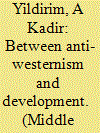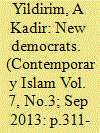| Srl | Item |
| 1 |
ID:
146778


|
|
|
|
|
| Summary/Abstract |
As Turkey's Gezi Park protests reminded us, Islamist parties the world over demonstrate utter disregard of the environment in their discourse and actions. However, Islam as a religion places strong emphasis on environmental protection. Thus, as the representatives of Islam that these parties claim themselves to be, it is puzzling that environmental policy is all but absent from most Islamist platforms. I ask, what explains the poverty of Islamists in regards to the environment? I argue that the reason for this poverty is found within and conforms to political Islam's problematic relationship with modernity, particularly in regards to their strong anti-western sentiment and self-purported victim status. My findings suggest that the inattention Islamists give to the environment is due to their association of environmentalism with the West and because of the uniquely unfavourable socio-economic environments in which they exist, which sends environmentalism to the purview of ‘low politics’. This analysis points to an inherent weakness in Islamist ideology – their lack of pragmatic policy. Hence, the peculiar case of Islamists and the environment is but a symptom of a larger issue within Islamism and can be a key element to understanding why and how Islamism is likely to fail.
|
|
|
|
|
|
|
|
|
|
|
|
|
|
|
|
| 2 |
ID:
121884


|
|
|
|
|
| Publication |
2013.
|
| Summary/Abstract |
I analyze the positive and leading role religious actors play in democratic consolidation in Turkey in recent years. I argue that major social changes might lead to such outcomes. Empirically, I show that two major religious actors in Turkey-the Gulen Movement and the Justice and Development Party (AKP)-have adopted favorable positions on EU membership, ethnic and religious minorities, and pluralism in the last decade. This remarkable transformation owes its existence to the economic liberalization reforms initiated in the early 1980s, and the "post-modern coup" of 1997. This transformation reflects the need of both religious actors for greater democracy from a purely self-interested perspective. The Gulen Movement prefers an open and democratic system to sustain its organizational existence. The AKP responds to the preferences of its own constituency. These unique conditions have made two religious actors catalysts of democratization along with some liberal democrats in Turkey. Empirically, I rely on European Union's Turkey progress reports and a recent analysis of religious Turkish media to support the argument.
|
|
|
|
|
|
|
|
|
|
|
|
|
|
|
|
| 3 |
ID:
176096


|
|
|
|
|
| Summary/Abstract |
RELIGIOUS PARTIES AND THEIR IDEOLOGIES have captured the imagination of academic scholarship and public discussion since the 1980s. Specifically, Islamist parties have become a focal point as they entered the electoral politics of many Middle Eastern countries. Much of this focus is devoted to how such parties engage in ideological moderation—a legitimate academic concern with important practical implications for democratic governance, pluralism, and violence. Observers often treat religious ideology either as a fixed attribute on one extreme, or as an entirely malleable and instrumental feature on the other. For example, the Turkish president and leader of the Justice and Development Party (AKP), Recep Tayyip Erdoğan, has been criticized since his rise to political prominence in the mid‐1990s for being too ideologically rigid and threatening secularism in Turkey, gradually moving the country closer to a theocracy.1 Simultaneously, Erdoğan is characterized as a political opportunist who has no ideological commitments and exploits religion with reckless abandon to serve his own political interests.2 Yet these two seemingly conflicting views are not incompatible.
|
|
|
|
|
|
|
|
|
|
|
|
|
|
|
|